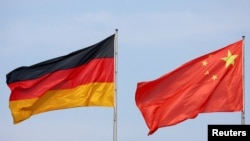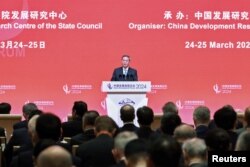A fresh pledge by Beijing to treat foreign companies like domestic rivals drew a cool response from one of its biggest trading partners, Germany, where industries called for concrete actions rather than words to create a true level-playing field.
Germany's engagement in the world's No.2 economy has been in focus, partly because China remains its biggest trading partner but also because Berlin has asked companies to diversify away from what it calls "partner, competitor and systemic rival."
Beijing's efforts to make sure international companies stay engaged come as inbound foreign direct investment shrank by 8% in 2023, partly a result of broader anti-espionage laws, exit bans and raids on consultancies and due diligence firms.
German direct investment in China, however, rose to a record high of 11.9 billion euros ($12.9 billion) last year, underscoring how relevant the market remains despite efforts to reduce exposure.
In a bid to attract more foreign money, Chinese Vice Commerce Minister Guo Tingting told the China Development Forum in Beijing that the country would "fully guarantee national treatment for foreign companies," without elaborating further.
"We are seeing more and more of what I'll call friendly signals," said Oliver Wack, Asia expert at German engineering association VDMA, which represents heavyweights including Siemens and Thyssenkrupp.
"But in terms of content, this is not exactly earth-shattering."
More than words?
Wack said efforts by Beijing included a Dec. 12 meeting with the head of economics at China's consulate general in Frankfurt who asked what had to be done to encourage more of the VDMA's members to invest in China.
As part of a series of events this week in the Chinese capital with foreign companies, the Ministry of Commerce will hold the Invest in China Summit 2024 on Tuesday, where Pfizer CEO Albert Bourla and AstraZeneca CEO Pascal Soriot are due to speak, according to a schedule.
AstraZeneca declined to comment, and Pfizer confirmed Bourla is attending the China Development Forum and speaking on a panel at the Invest in China Summit but declined to comment further.
The Wall Street Journal separately reported that Chinese leader Xi Jinping plans to meet a group of U.S. business leaders this week after the forum as Beijing steps up efforts to woo American firms amid an exodus of foreign capital.
VDMA's Wack said to make effective changes China should join the World Trade Organization's Government Procurement Agreement and the OECD (Organization for Economic Cooperation and Development). Both would be tangible steps to create equality among companies.
Dirk Jandura, president of the Federation of German Wholesale, Foreign Trade and Services, also poured cold water on hopes that the latest Chinese push would really change things.
"We are familiar with these kind of promises. Unfortunately, in the past, it has often remained just words, or changes have been made in small steps ... The extent to which foreign entrepreneurs can make a contribution here — remains unclear."







